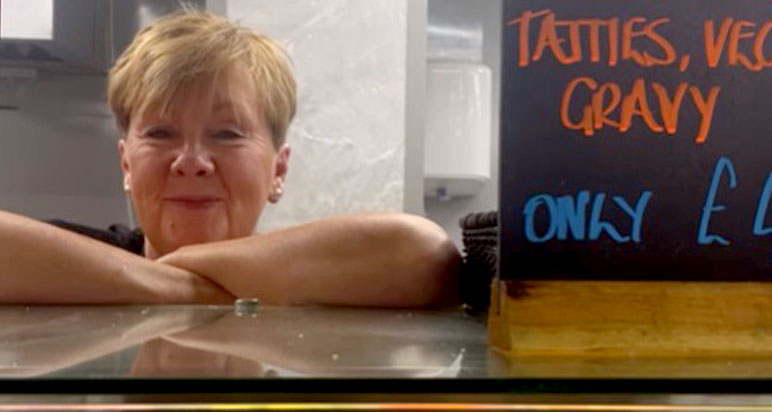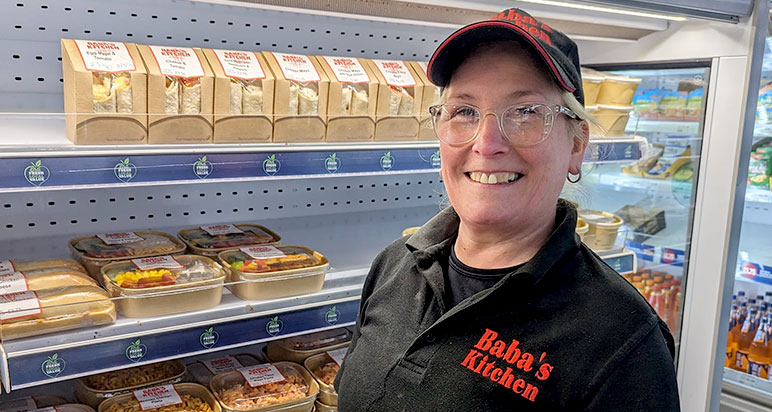Thriving food-to-go retailers share their recipes for success and plans for 2025.
Roofers, bricklayers and landscapers are flocking to Broadway Convenience near Edinburgh to refuel on its wholesome, hearty deli fare. What started as a sideline to give the store a USP has fast become a cornerstone, contributing 15% of the shop’s turnover. “It’s turned into a bit of a beast!” says Sophie Williams, who has taken on much of the running of the store from her parents Linda and Dennis, and is regularly roped in to help with the deli.
A basic hot roll offer was expanded with hot pies from local butcher and bakery, McGills. Then Linda, who heads up the deli, started making soups, which turned the store into a destination outlet. “They’re really popular because we have a lot of tradesmen working in the cold, and this is proper, homemade chunky soup, full of veg,” she says. “They’ll travel quite a distance for it. Off the back of that, I thought, ‘I wonder if they’d like lunch too’.” So Linda now whips up daily special dishes like steak pie, mince & tatties, and chicken curry & rice.
That’s on top of paninis, toasties, baguettes, pasta pots, sandwiches and filled rolls – the latter of which sell 150 a day.
When it comes to food to go (FTG), knowing your audience is vital, notes Stephen Brown, head of FTG at Spar Scotland. “Different locations have different needs and wants,” he says, noting that the firm’s various bakery partners help stores to cater to the needs of their local area. “Bakery products can be quite a parochial thing based on your area, so if you’re brought up in Dunfermline, Stephens Bakery’s Steak Bridies is your go-to. Whereas if you are brought up in Kilmarnock, Killie Pie from Brownings the Bakers would be the famous product that you would recognise.”
Analysing the local offer and whether you can fill a gap in the market is also crucial. “Rural stores are some of our busiest sites,” he states. “For example, for Spar Balmacara in Skye – the nearest McDonald’s is Inverness, so it’s a two-hour drive, but we can provide that burger on the road.”
Innes MacDonald, who owns two Spar stores in Inverness and Scourie is certainly making the most of the latter’s location near a campsite on the North Coast 500 route. “Scourie has a population of 200 people, but food to go is absolutely bonkers!” he says. “Even in winter it more than justifies itself and in summer we do £7,000 to £8,000 a week in food to go plus coffee.”
In winter, the store sells 10-15 breakfast rolls in the morning, plus sausage rolls and pies, and in summer, this shoots up to 30 or 40. The store makes its own sandwiches too.
“We use the labelling that Country Choice gives us,” says Innes. “You invest a bit of time first thing in the morning pre-packing. If you get a load of cyclists in, or two or three campervans full of tourists, or workers from the local salmon farm, they don’t want to be hanging about while you’re making up rolls.”
He also sells Flatstone pizza, which is hugely popular with the local campers. The pizzas have a 40% margin. “It isn’t as much as it could be, but I don’t want to sting people too hard,” he says. Despite the summer washout, he was averaging 30 a night. “Even though we were down £350/£400 a day, we were still up on hot food 10% year-on-year,” he says.
Room for growth

While Innes is enjoying his success with FTG, keeping pace with demand presents numerous obstacles.
“Deliveries are hard – we only get two a week from Country Choice, which is a real pain,” he sighs. His 1,000sq ft store has a 400sq ft stock room, which struggles to contain sufficient supplies. “Sometimes 100 cyclists come in and clean us out of all our sandwiches. Then we’re snookered!” he says. “Trying to hold enough stock in our freezers for that amount of sales, we’re creaking at the seams. We need to do something with back-of-store because we regularly run out of stock. Whether we add an outside storage unit for non-food, something’s got to give.”
Umar Majid of Baba’s Kitchen in Bellshill is also looking to invest further in FTG in order to keep up with customers’ appetite for store-made food. He has already reaped the rewards of a major FTG-focused refit in 2019, which has helped him achieve weekly sales of between £7,000 and £11,000 a week, across the hot food counter and shop-made meals. Comprising chef-prepared dishes, such as Pasta Bolognese, Enchiladas and Chinese Chicken Curry, the store sells between 320 and 350 meals a week, while between 40 and 60 soup portions are served up each day.
With ready meal sales alone almost doubling in the past year, Umar is hungry for another upgrade, but is currently still sizing up the return on investment.
More equipment is needed to cope with soaring demand, he says. “I’d like bigger fryers. We were only doing a 2.5kg bag of chips once a week and now we’re doing anywhere between four and six bags, Monday to Friday, and between eight and 12 bags at the weekend.”
Umar’s also got his eye on a new bain marie to aid efficiency. “With the last refit, I specifically wanted an open bain marie so that it was easy for our staff to grab the food and put it straight onto a roll. But we found that having no doors meant that it didn’t keep the heat in as well, so sometimes the food wasn’t keeping above 63 degrees. So in the next refit, I definitely want to have doors so that we’re not having to reheat it.”
This in turn would enable him to save on energy costs, which are a major headache. “Energy is definitely the biggest difficulty right now,” he says. “Our electricity bill was £66,000 last year and this year it is £82,000 a year because of the Russia Ukraine war and obviously the energy prices went up.”
He is currently doing everything he can to minimise consumption. “We already have a few energy-saving practices in place. For example, we have three fryers; so now we turn one on a bit later.”
Linda can relate. “Energy costs very much affect us,” she says. “Colleen, our manager, suggested turning the griddle down a notch and start putting the immersion heater off for an hour every now and then. We’re watching the pennies, but it is a massive cost and also the extractor fan is running constantly. But it is the price you pay for fresh food.”
The store is also a victim of its own FTG success, having outgrown its current extractor fan. “What we’ve got is not quite up to the job, so I think we’re going to have to spend a bit of money and get a bigger kit for that,” she says.
The popularity of the deli is taking its toll on Linda too, and she is eager to relieve some of the pressure by taking on a new chef. “It’s getting a little bit much for me, but it’s not easy to find the right person and until I do, I’m not willing to relinquish it,” she says.
Sophie adds: “Working in the deli is not just about cooking, you also need to have the customer service skills to have that back and forth with the customer, especially with our clientele. Within the deli it’s all tradesmen that call in. They want a laugh as well as their food.”
Grand plans

Baba’s Kitchen feels most grateful to have “culinary maestro” Bella on board. If he goes ahead with his mini refit, Umar wants to make the most of the passionate chef’s skills to embark on a new initiative. “Bella knows how to batch cook products, so I want to be able to batch cook our soup, or our lasagna and then sell it to other stores.”
Another item on Umar’s agenda for 2025 is cracking the evening dining occasion. “Evening meals is something I’m trying to branch out with,” he says. “We currently have Late Thursdays where food can be ordered until 6pm.”
But increased overheads are putting a spanner in the works. “The issue that I have is that our electricity costs are already so high. I’m trying to figure out the risk calculation if we keep all the equipment on for an extra four or five hours, how many sales do I need to generate to balance that out and have an extra staff member? From one brief calculation I think I was going to have to increase the revenue by about £1,000 over three days.”
Enticing people into the shop in the evening is also proving tricky. “Right now with where the economies are, the Late Thursday experiment is not working,” he says. “We found that within the shop as well after 6pm it’s really quiet. People just hunker down once they get in from work. They go on Just Eat and place an order for a takeaway.”
In addition, he feels that his FTG offer requires a revamp. “You need to have a different dinner menu because our steak pie isn’t going to sell; people want smash burgers and fried chicken.
Meanwhile, the winning combination of Flatstone pizza and an adjoining bar, mean that Innes is nailing night-time FTG at Scourie Spar. But he is on the hunt for a second dish to tempt people. “We need to find something that we can bang out on menus that’s really easy to do,” he says. “Pizzas are fine because they cook within seven minutes.”
If he gets his FTG offer right, Innes reckons he can grow the category from 20% to 30% of Scourie’s sales.
Spar Scotland’s Stephen Brown is also optimistic about future growth. “In terms of our food to go category, we’re looking for a 20 to 25% growth,” he says. But he is not convinced that an evening offer holds the key. “I’m not saying at some point we wouldn’t want to tap into the evening food-to-go occasion, certainly we would. But at the same time, I think concentrate on your breakfast and your lunch and your daytime offer.”
A risk worth taking?
Innes can’t understand why more people aren’t taking advantage of FTG. “Despite me telling everyone on the northwest ring how good food to go is and that they should go into it properly, they don’t,” he says.
Linda and Sophie advise retailers to proceed with caution. If executed well – as it has been at Broadway Convenience – FTG can be a lifesaver. “It’s been a complete change of the focus of the business, but without it, the shop 100% would not have survived,” says Linda.
FTG lines not only generate the store tasty margins of between 50 and 100%, but deli shoppers are also big spenders. “The average spend of a deli customer is about three times what the average store customer spends, and if they weren’t coming into the deli, there wouldn’t be enough trade for the shop just on its own.”
Sophie concludes: “It’s a huge, huge undertaking and I don’t think people should go into it lightly. You need to weigh up all of your options, but if you can do it and you can do it successfully, I think it is a massive benefit for your store.”

Scourie Spar owner Innes MacDonald tells SLR he has started to sell a lot more coffee of late.
The reason for the hike in coffee sales is down to his recent investment in Barista Bar. “I was in two minds about it,” he conceded. “I’d pushed Tchibo onto a lot of people because it was so good.” However, the old machine used powdered milk, whereas the new machine uses fresh, and Innes was amazed with the results. “We’re 30% up in sales, it’s flying!” he grins. “The Barista visually and quality-wise blows you away,” he says.
Brown adds: “Working in conjunction with Henderson’s, Barista Bar has exceeded all expectations,” he says. “It is exclusive to Spar in Scotland. In terms of the margins and the way it’s operating, it is far superior to other coffees on the road and in Northern Ireland it’s the number one brand by a long way.
“We’ve got a breakfast meal deal, which is just £2.99 for a coffee and a breakfast roll. So, when the coffee is £2.60, you’re actually buying a breakfast roll for 39p and the retailer is still making a good margin on that.”
Barista Bar brand manager, Keavy O’Mahony-Truesdale, says: “We’ve had a tremendous 2024 with CJ Lang. From March until December we installed Barista at 116 Spar Scotland sites.” She reveals that company-owned stores have since seen a 37.5% uplift in cup numbers.
The machines have also made their way into several independent retailers and O’Mahony-Truesdale is hopeful that more will follow suit. “They’ve been watching and hearing the success from their peers and now the appetite is definitely that they want a piece of the action,” she says.
“At 1.1 metre wide, it’s the best addition you can put in your store to bring in revenue, improve profits and improve footfall.”








